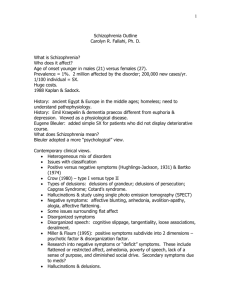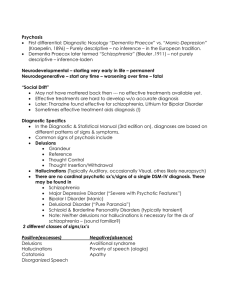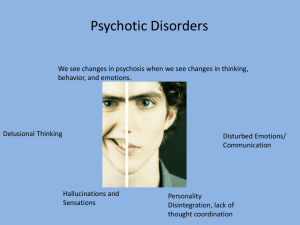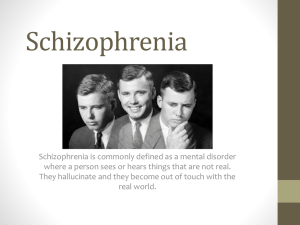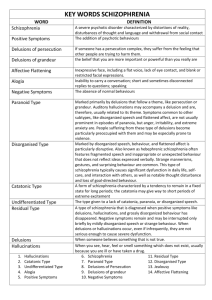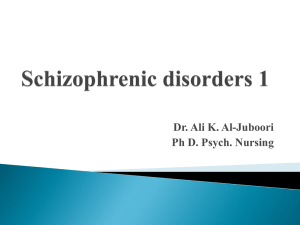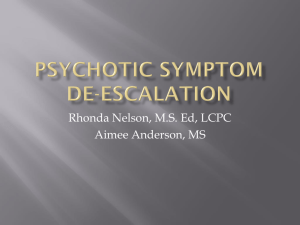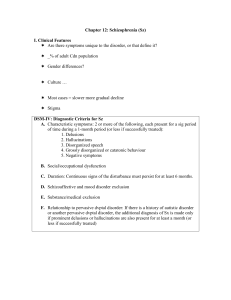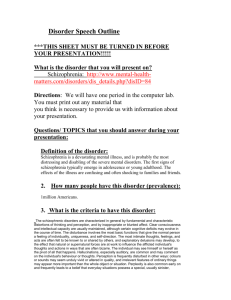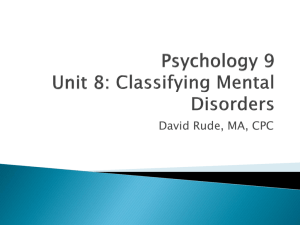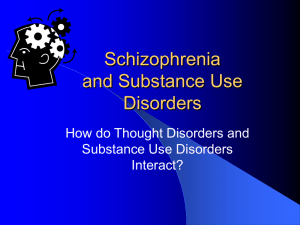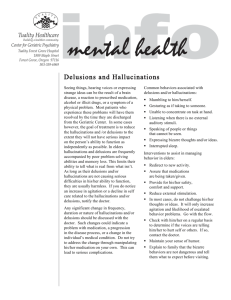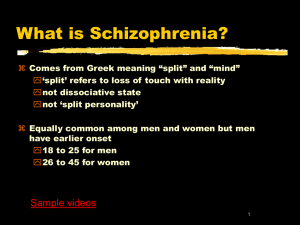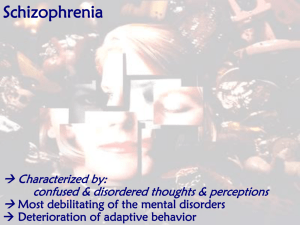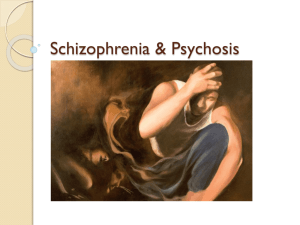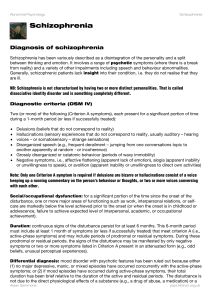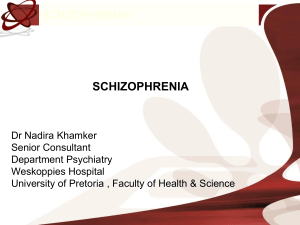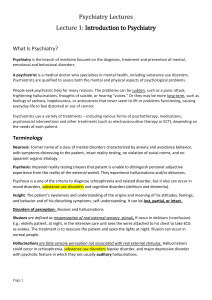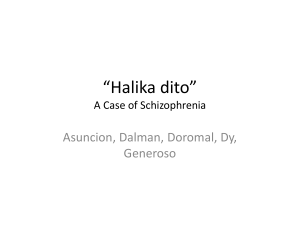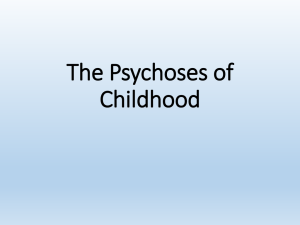Schizophrenia symptoms
advertisement
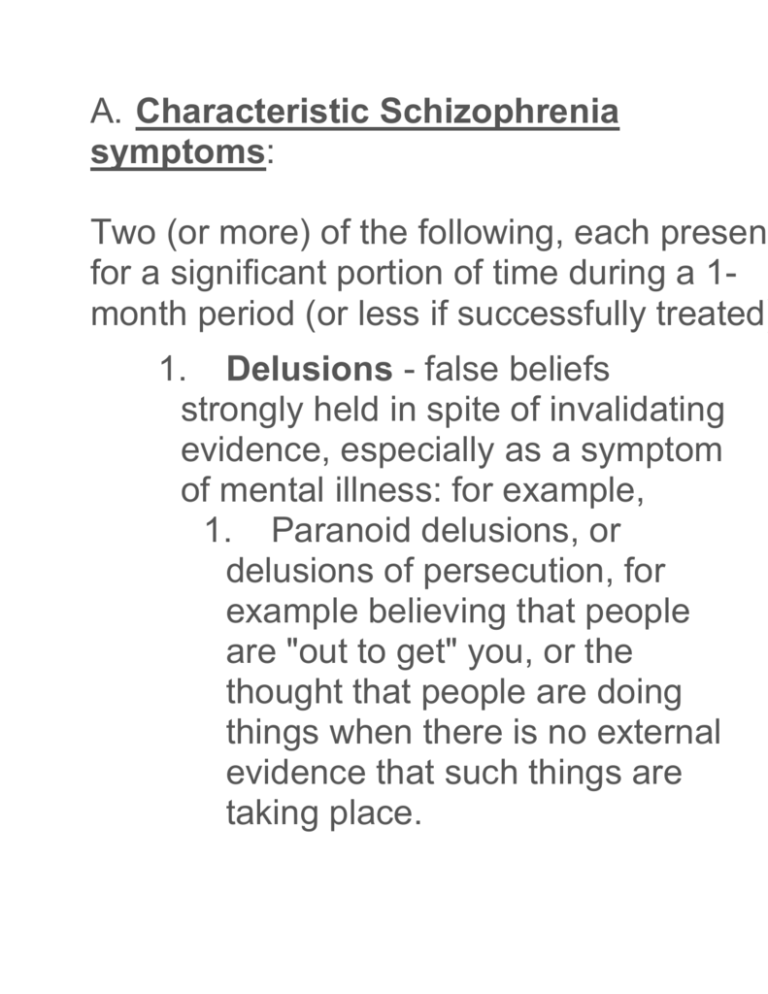
A. Characteristic Schizophrenia symptoms: Two (or more) of the following, each present for a significant portion of time during a 1month period (or less if successfully treated) 1. Delusions - false beliefs strongly held in spite of invalidating evidence, especially as a symptom of mental illness: for example, 1. Paranoid delusions, or delusions of persecution, for example believing that people are "out to get" you, or the thought that people are doing things when there is no external evidence that such things are taking place. 2. Delusions of reference when things in the environment seem to be directly related to you even though they are not. For example it may seem as if people are talking about you or special personal messages are being communicated to you through the TV, radio, or other media. 3. Somatic Delusions are false beliefs about your body - for example that a terrible physical illness exists or that something foreign is inside or passing through your body. 4. Delusions of grandeur - for example when you believe that you are very special or have special powers or abilities. An example of a grandiose delusion is thinking you are a famous rock star. 2. Hallucinations - Hallucinations can take a number of different forms - they can be: 1. Visual (seeing things that are not there or that other people cannot see), 2. Auditory (hearing voices that other people can't hear, 3. Tactile (feeling things that other people don't feel or something touching your skin that isn't there.) 4. Olfactory (smelling things that other people cannot smell, or not smelling the same thing that other people do smell) 5. Gustatory experiences (tasting things that aren't there) 3. Disorganized speech (e.g., frequent derailment or incoherence) - these are also called "word salads". Ongoing disjointed or rambling monologues - in which a person seems to be talking to himself or imagined people or voices. 4. Grossly disorganized or catatonic behavior (An abnormal condition variously characterized by stupor/inactivity, mania, and either rigidity or extreme flexibility of the limbs). 5. "Negative" symptoms of Schizophrenia , these symptoms are the lack of important abilities. Some of these include: Alogia, or poverty of speech, is the lessening of speech fluency and productivity, thought to reflect slowing or blocked thoughts, and often manifested as short, empty replies to questions. Affective flattening is the reduction in the range and intensity of emotional expression, including facial expression, voice tone, eye contact (person seems to stare, doesn't maintain eye contact in a normal process), and is not able to interpret body language nor use appropriate body language. Avolition is the reduction, difficulty, or inability to initiate and persist in goal-directed behavior; it is often mistaken for apparent disinterest. (examples of avolition include: no longer interested in going out and meeting with friends, no longer interested in activities that the person used to show enthusiasm for, no longer interested in much of anything, sitting in the house for many hours a day doing nothing.) A short summary of a list of negative symptoms are: 1. lack of emotion - the inability to enjoy regular activities (visiting with friends, etc.) as much as before 2. Low energy - the person tends to sit around and sleep much more than normal 3. lack of interest in life, low motivation 4. Affective flattening - a blank, blunted facial expression or less lively facial movements, flat voice (lack of normal intonations and variance) or physical movements. 5. Alogia (difficulty or inability to speak) 6. Inappropriate social skills or lack of interest or ability to socialize with other people 7. Inability to make friends or keep friends, or not caring to have friends 8. Social isolation - person spends most of the day alone or only with close family Note: Only one Criterion A symptom is required if delusions are bizarre or hallucinations consist of a voice keeping up a running commentary on the person’s behavior or thoughts, or two or more voices conversing with each other. Cognitive Symptoms of Schizophrenia Cognitive symptoms refer to the difficulties with concentration and memory. These can include: disorganized thinking slow thinking difficulty understanding poor concentration poor memory difficulty expressing thoughts difficulty integrating thoughts, feelings and behavior B. Social/occupational dysfunction: For a significant portion of the time since the onset of the disturbance, one or more major areas of functioning such as work, interpersonal relations, or self-care are markedly below the level achieved prior to the onset (or when the onset is in childhood or adolescence, failure to achieve expected level of interpersonal, academic, or occupational achievement). C. Duration: Continuous signs of the disturbance persist for at least 6 months. This 6-month period must include at least 1 month of symptoms (or less if successfully treated) that meet Criterion A (i.e., active-phase symptoms) and may include periods of prodromal or residual symptoms. During these prodromal or residual periods, the signs of the disturbance may be manifested by only negative symptoms or two or more symptoms listed in Criterion A present in an attenuated form (e.g., odd beliefs, unusual perceptual experiences). D. Schizoaffective and mood disorder exclusion: Schizoaffective disorder and mood disorder with psychotic features have been ruled out because either (1) no major depressive, manic, or mixed episodes have occurred concurrently with the active-phase symptoms; or (2) if mood episodes have occurred during active-phase symptoms, their total duration has been brief relative to the duration of the active and residual periods. E. Substance/general medical condition exclusion: The disturbance is not due to the direct physiological effects of a substance (e.g., a drug of abuse, a medication) or a general medical condition. F. Relationship to a pervasive developmental disorder: If there is a history of autistic disorder or another pervasive developmental disorder, the additional diagnosis of schizophrenia is made only if prominent delusions or hallucinations are also present for at least a month (or less if successfully treated).
